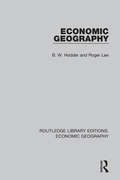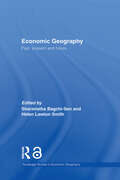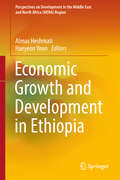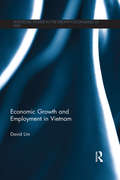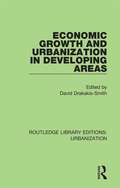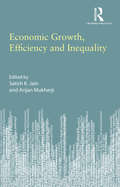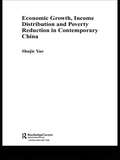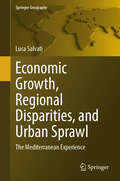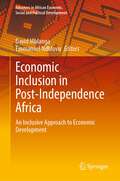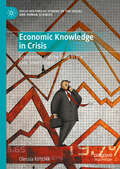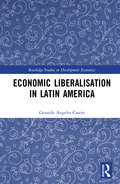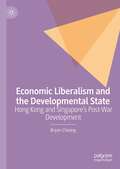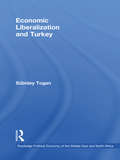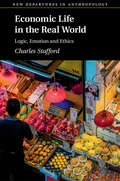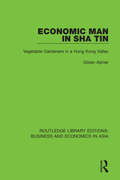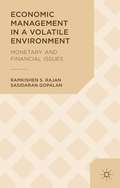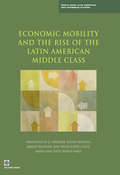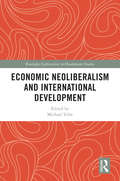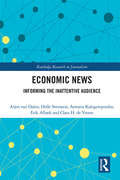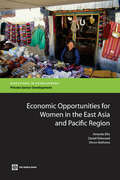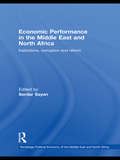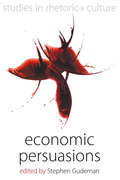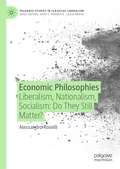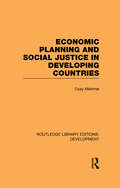- Table View
- List View
Economic Geography: Alternative Economic And Political Spaces (Routledge Library Editions: Economic Geography)
by Roger Lee B. W. HodderThis book introduces the reader to the many lines of thought in the literature on economic geography and ties these various aspects together within the concept of the economy. The book focusses on the dynamic and integrated nature of economies at different scales and levels of development. Emphasis is laid on the processes at work within economies. The authors discuss the concept of the economy, helping both to clarify the nature of economic activity and to reveal the importance and sources of economic power as the underlying means of control in economies. They also demonstrate that the operation of an economy and the distribution of economic power are critical influences on many other, apparently non-economic, aspects of human existence.
Economic Geography: Past, Present and Future (Routledge Studies in Economic Geography)
by Sharmistha Bagchi-Sen Helen Lawton SmithThe impact of economic geography both within and beyond the wider field of geography has been constrained in the past by its own limitations. Drawing together the work of several eminent geographers this superb collection assesses the current state of knowledge in the sub discipline and its future direction. In doing so, the contributors show how economic geographers have offered explanations that affect places and lives in the broader context of the global economy. Offering a discussion of theoretical constructs and methodologies with the purpose to show the need to combine different approaches in understanding spatial (inter) dependencies, contributors also demonstrate the need to engage with multiple audiences, and within this context they proceed to examine how geographers have interfaced with businesses and policy. This excellent collection moves economic geography from a preoccupation with theory towards more rigorous empirical research with greater relevance for public policy. With excellent breadth of coverage, it provides an outstanding introduction to research topics and approaches.
Economic Geography: Past, Present and Future (Routledge Studies in Economic Geography)
by Sharmistha Bagchi-Sen Helen Lawton SmithThe impact of economic geography both within and beyond the wider field of geography has been constrained in the past by its own limitations. Drawing together the work of several eminent geographers this superb collection assesses the current state of knowledge in the sub discipline and its future direction. In doing so, the contributors show how economic geographers have offered explanations that affect places and lives in the broader context of the global economy. Offering a discussion of theoretical constructs and methodologies with the purpose to show the need to combine different approaches in understanding spatial (inter) dependencies, contributors also demonstrate the need to engage with multiple audiences, and within this context they proceed to examine how geographers have interfaced with businesses and policy.This excellent collection moves economic geography from a preoccupation with theory towards more rigorous empirical research with greater relevance for public policy. With excellent breadth of coverage, it provides an outstanding introduction to research topics and approaches.
Economic Growth and Development in Ethiopia (Perspectives On Development In The Middle East And North Africa (mena) Region Ser.)
by Almas Heshmati Haeyeon YoonThis volume is a collection of selected empirical studies on determinants of economic growth and development in Ethiopia.The core argument for editing this book is to provide an up-to-date picture of the state and patterns of growth and development in Ethiopia. Ethiopia has been under focus in the past due to draughts, war, famine, development changes and the effects of global economic crisis in the country. A main contribution of this volume is that it helps identify selected important determinants of growth and development in Ethiopia and provides an estimation of their effects using up-to-date data, modelling and methods. Taken together the studies provide a comprehensive picture of the state of growth and development, their measurements, causal relationships and evaluation of efficient policies and practices in achieving progress in Ethiopia. The issues covered represent major challenges to the government and development organizations who are aiming at achieving higher growth and alleviating poverty in the country. The studies cover transition from rural agriculture to urban industry and the development of services.
Economic Growth and Employment in Vietnam (Routledge Studies in the Growth Economies of Asia)
by David LimVietnam has enjoyed significant economic success since the implementation of its "doi moi" reforms, including rapid growth in GDP, exports and foreign and domestic investment, and a shedding of poorly-performing state-owned enterprises. Despite this, however, the economic situation for many ordinary people in Vietnam is fragile, with income only just above the poverty line, and high unemployment, especially among the young. In addition, inflation is high, and the state-owned sector is still large, much of it still performing badly. This book provides a comprehensive overview of the current economic situation in Vietnam. It outlines the state of the economy, paying special attention to employment, discusses government policies including on trade and integration with the global economy, and concludes by assessing the key challenges facing Vietnam’s economy going forward.
Economic Growth and Urbanization in Developing Areas (Routledge Library Editions: Urbanization #2)
by David Drakakis-SmithOriginally published in 1990, Economic Growth and Urbanization in Developing Areas is a wide-ranging collection of research studies focused on urban economic growth at various levels of urban and national development. The contributions range from studies of peripheral Third World states, such as Fiji and Malaysia, to countries of the so-called semi-periphery, such as Spain, South Africa, and Northern Australia. In addition the authors cover a variety of thematic topics within the framework of urban economic development, from the provision of basic services such as housing and food, to the functional preservation of historic cores, and the impact of economic change on family structure.
Economic Growth, Efficiency and Inequality
by Satish K. Jain Anjan MukherjiThis volume deals with a range of contemporary issues in Indian and other world economies, with a focus on economic theory and policy and their longstanding implications. It analyses and predicts the mechanisms that can come into play to determine the function of institutions and the impact of public policy.
Economic Growth, Income Distribution and Poverty Reduction in Contemporary China (Routledge Studies on the Chinese Economy #Vol. 13)
by Shujie YaoChina has experienced over a quarter century of rapid economic growth, which has had a phenomenal impact on the global economy. Entering into the twenty-first century implies that China has begun a new phase of economic and social development. Yao reviews the economic development history of contemporary China from 1949 to the present, paying special attention to growth, inequality and poverty reduction. A real Chinese economic miracle should have two important features: high income growth and a fair distribution system so that poverty can be eradicated.
Economic Growth, Regional Disparities, and Urban Sprawl: The Mediterranean Experience (Springer Geography)
by Luca SalvatiThis book gives a unique description of urban geography of Europe and specifically, Southern Europe, and provides a fine guide to urban complexity and resilience in the light of metropolitan sustainability. Sprawl is a multifaceted phenomenon that needs to be quantified with distinct measures and during an enough long observation period. Landscape change is recognized to be a relevant topic when studying the impact of urban growth and sprawl on peri-urban land. In the kaleidoscopic panorama of urban Europe, Mediterranean cities represent an element that breaks with the stereotypes of the 'old continent' urbanities. Originally developed according to a purely mono-centric structure, which grew radio-centrically with the progressive addition of satellite urban areas, Mediterranean cities have more recently oriented their growth path towards dispersed settlement models. This resulted in a high consumption of land, in contrast with the 'judicious compactness' that characterized the tumultuous development of the cities at least in the first three decades after World War II. This book tells, through narratives, photographs, qualitative-quantitative descriptions of landscapes, maps and indicators, the transition from a compact model—`judiciously mono-centric' and `land saving'—to contemporary sprawl, with practical implications in economic geography. The environmental, social and economic implications of this phenomenon, far from being a unique characteristic of the European Mediterranean region, have been also discussed, and the planning and policy implications addressed with respect to the individual ecological problems faced from time to time.
Economic Inclusion in Post-Independence Africa: An Inclusive Approach to Economic Development (Advances in African Economic, Social and Political Development)
by David Mhlanga Emmanuel NdhlovuThe second in a three-volume series, this edited volume discusses post-independence economic inclusion in selected African countries. While human development indices rise and poverty rates fall across the African continent, facilitated by recent technological and innovation development which reaches previously inaccessible regions, indicators continue to lag in several crucial areas. Economic and social inclusion, therefore, remains at the forefront of development discussions across the continent. Using a variety of case studies underpinned by multidisciplinary research approaches, the chapters in this book explore a wide range of economic and financial inclusion issues from all aspects; from benefits and challenges to the steps that need to be taken to improve the level of economic inclusion on the continent. Governments, development agencies, non-governmental organizations with a bias toward development, students, and university lecturers will all find this book interesting.
Economic Knowledge in Crisis: Economists and the State in the Late Soviet Union (Socio-Historical Studies of the Social and Human Sciences)
by Olessia KirtchikThis book aims to shed new light on the puzzle of the late Soviet conversion to the “market” and capitalism by revisiting the history of Soviet reform economics. Using a variety of sources, including interviews with economists, archival files, and published materials, it examines the social contexts in which economists employed in economic administration and research institutions could have played a crucial public and political role, the forms of their participation, and the social and political logic behind the selection of economic experts and their rise to power during perestroika and the “transition” period. It also compares the professional trajectories of these reformist economists and assesses the scope of this group’s influence in the post-Soviet period in order to conclude on the new state of economic expertise in Russia.
Economic Liberalisation in Latin America (Routledge Studies in Development Economics)
by Gerardo Angeles-CastroThis book explores the process of economic liberalisation in Latin America and revises the transition from the import substitution industrialisation model to market-oriented reforms. It explains the theoretical foundations of the neoliberal paradigm and the implications of the policies that were labelled as the Washington Consensus. The book also incorporates an assessment on the socio-political norms added to the orthodox prescription, the so-called Post-Washington Consensus. The study comprises a general analysis on the subcontinent and on different economic liberalisation paths, and looks at four country case studies: Mexico, Brazil, Chile, and Uruguay, from the 1980s to recent years. From this approach, the reader can analyse weaknesses and strengths, the socioeconomic performance, and the difficulties that Latin America has presented through the turbulent process of economic liberalisation, both at an early stage and over the long run, by means of country case studies encompassing the most diverse and representative styles of economic openness in the subcontinent. This allows them to identify the challenges the country faces and the appropriate policies they can follow to cope with sustained economic growth, poverty reduction, and income distribution within an economically open environment. The study is carried out by analysing and contrasting theoretical and empirical perspectives, allowing a broader understanding of the topics. The book is complementary reading for textbooks, due to the objectivity with which it addresses important and quotidian issues in the region, associating empirical and theoretical topics, and facilitating the understanding of the international political economy of Latin America. It is also suitable for practitioners and researchers, because of the depth in which it covers specific topics and the useful analysis it conducts to incorporate policy implications and suggestions for achieving equitable growth in a context of liberal markets.
Economic Liberalism and the Developmental State: Hong Kong and Singapore’s Post-war Development
by Bryan CheangThis book provides a fresh perspective on the debate over the role of the state in East Asia’s development history. Comparing the post-war development policies of Singapore and Hong Kong, it argues that their strong economic performances preceded and persisted despite, not because of, developmental state policies. While both nations are not pure free markets, the Hong Kong economy comes closer to that ideal and exhibited clear advantages over state-driven Singapore, in terms of greater levels of indigenous entrepreneurship, productivity and innovation.The book highlights the complex ways in which states penetrate markets, which are often neglected in liberal accounts of Hong Kong and Singapore as ‘free-market success stories’. At the same time, it also stands as a cautionary tale on the use of non-comprehensive development planning in the twenty-first century, where an unprecedented degree of complexity complicates economic policy and industrial upgrading. The book renews the case for economic liberalism in development policy through a unique Asian cultural lens.
Economic Liberalization and Turkey (Routledge Political Economy of the Middle East and North Africa)
by Sübidey ToganThe liberalization of the Turkish economy is a key factor affecting Turkey’s application to join the European Union. This book examines the impact of economic liberalization in Turkey and Turkey’s approach to the elimination of barriers to trade. It focuses on the liberalization of trade in Turkey’s agricultural and industrial commodities sector and key services such as telecommunications, electricity, natural gas, banking and transport. The chapters include thorough discussions on WTO and EU approaches for the elimination of barriers to trade, international and EU rules and regulations in the various service sectors, and the methods for estimating the tariff equivalents of barriers to trade in the different service sectors as well as methods for estimating the benefits of liberalization of services for Turkey. The experience of Turkey, its approach to liberalization and its measures to eliminate barriers to trade serve as a useful model for other neighboring countries of the European Union.
Economic Life in the Real World: Logic, Emotion and Ethics (New Departures in Anthropology)
by Charles StaffordThis clearly written and engaging book brings together anthropology, psychology and economics to show how these three human science disciplines address fundamental questions related to the psychology of economic life in human societies - questions that matter for people from every society and every background. Based around vivid examples drawn from field research in China and Taiwan, the author encourages anthropologists to take the psychological dimensions of economic life more seriously, but also invites psychologists and economists to pay much more attention than they currently do to cultural and historical variables. In the end, this intrinsically radical book challenges us to step away from disciplinary assumptions and to reflect more deeply on what really matters to us in our collective social and economic life.
Economic Man in Sha Tin: Vegetable Gardeners in a Hong Kong Valley (Routledge Library Editions: Business and Economics in Asia #11)
by Göran AijmerThis book, first published in 1980, is a study of how refugee immigrants from China make a living as market gardeners in a valley in Hong Kong. Based on extensive field-work, it examines various aspects of economic life; the discussion concerns the adaptations necessitated on the part of the gardeners by the new socio-economic structures which present themselves. The general problem of agricultural change is discussed and the Hong Kong observations are systematized into a comparative Chinese framework.
Economic Management In A Volatile Environment
by Ramkishen S. Rajan Sasidaran GopalanSince the 1990s, several emerging market economies (EMEs) have, to varying degrees, embraced the process of 'financial globalisation', broadly defined as a set of policies that involve allowing for greater openness to cross-border capital flows as well as greater market access to foreign financial institutions. While the EMEs have surpassed the advanced economies in 2013 by accounting for over half of global output, they are not without their concerns. They have been faced with a variety of policy challenges owing to their increasing integration with global financial markets. This book discusses some of the challenges relating to macroeconomic and financial management in a volatile and uncertain world, brought about by greater financial openness. The emphasis of the book is on exploring the implications of a key set of issues emanating from financial globalisation on EMEs in a rigorous but readable manner.
Economic Mobility and the Rise of the Latin American Middle Class
by Francisco H. G. Ferreira Julian Messina Jamele Rigolini Luis-Felipe López-Calva Maria Ana Lugo Renos VakisAfter decades of stagnation, the size of Latin America's middle class recently expanded to the point where, for the first time ever, the number of people in poverty is equal to the size of the middle class. This volume investigates the nature, determinants and possible consequences of this remarkable process of social transformation. We propose an original definition of the middle class, tailor-made for Latin America, centered on the concept of economic security and thus a low probability of falling into poverty. Given our definition of the middle class, there are four, not three, classes in Latin America. Sandwiched between the poor and the middle class there lies a large group of people who appear to make ends meet well enough, but do not enjoy the economic security that would be required for membership of the middle class. We call this group the 'vulnerable'. In an almost mechanical sense, these transformations in Latin America reflect both economic growth and declining inequality in over the period. We adopt a measure of mobility that decomposes the 'gainers' and 'losers' in society by social class of each household. The continent has experienced a large amount of churning over the last 15 years, at least 43% of all Latin Americans changed social classes between the mid 1990s and the end of the 2000s. Despite the upward mobility trend, intergenerational mobility, a better proxy for inequality of opportunity, remains stagnant. Educational achievement and attainment remain to be strongly dependent upon parental education levels. Despite the recent growth in pro-poor programs, the middle class has benefited disproportionally from social security transfers and are increasingly opting out from government services. Central to the region's prospects of continued progress will be its ability to harness the new middle class into a new, more inclusive social contract, where the better-off pay their fair share of taxes, and demand improved public services.
Economic Neoliberalism and International Development (Routledge Explorations in Development Studies)
by Michael TribeThis book provides a robust theoretical and empirical exploration of the interrelationship between economic neoliberalism and international development. Putting the experiences of developing and transitional economies centre stage, the book investigates how their economic policies compare with the nature of economic liberalism during and after the significant economic reforms which took place from the mid-1980s. Beginning with two chapters which provide an introduction to the concept of economic neoliberalism, the second section focusses on its application to ‘practice’, and the book moves on to country/regional case studies, taken from Sub-Saharan Africa, South Asia, Latin America, China, and Eastern Europe. The book closes with some concluding remarks summarising some of the principal findings. Bringing together a wealth of expertise, this book clarifies controversial economic and political issues which have been significantly misunderstood in public discourse, and as such, it will be of interest to a range of researchers interested in the economic, social and political dynamics of developing and transitional countries.
Economic News: Informing The Inattentive Audience (Routledge Research in Journalism)
by Erik Albæk Arjen van Dalen Helle Svensson Antonis Kalogeropoulos Claes H. de VreeseThis book tells the story of how the news media can help the inattentive members of the public become better educated and knowledgeable ‘economic citizens’. The authors argue that changes in the economy, journalism and consumer culture have made economic news more visible, more mainstream and more accessible. They show how economic news not only affects economic perceptions, but also interest in the economy, knowledge about the economy, and economic voting. Relying on statistical analyses, the book provides a comprehensive and systematic study of the effects of economic news.
Economic Opportunities for Women in the East Asia and Pacific Region
by Amanda Ellis Daniel Kirkwood Dhruv MalhotraThe East Asia and Pacific region has made great progress, relative to other regions, with regard to both economic development and, specifically, economic opportunities for women. However, aspiring female entrepreneurs continue to face unequal barriers to starting, operating, and growing their businesses. Not only does this hurt business women in the region, but it also ultimately hurts poverty reduction and economic growth. 'Economic Opportunities for Women in the East Asia and the Pacific Region' brings together data and available evidence on the constraints that female entrepreneurs in the region face with regard to: access to assets, business regulations and governance issues, and available avenues for expanding businesses and trading with larger markets. The authors present recommendations at the end of each chapter. This book will be of interest to policy makers, donors, nongovernmental organizations, and researchers looking to further examine the constraints that are holding back female entrepreneurs in East Asia and the Pacific.
Economic Performance in the Middle East and North Africa: Institutions, Corruption and Reform (Routledge Political Economy of the Middle East and North Africa)
by Serdar SayanThe economies of the Middle East and North Africa (MENA) region are in dire need of substantial institutional reform to improve their growth performance so as to create enough jobs for millions of entrants into their respective job markets, and to fight poverty and income inequality. This is necessary not only to reduce the risk of social unrest and domestic/regional conflicts, but also to assure stability of energy supply to the rest of the world and to hamper the violence originating from the region. So, the region's convergence to global standards of governance quality is desirable for increased prosperity and stability both in the region and outside. This volume contributes to the recently burgeoning political economy literature on institutions by putting together well-written chapters that empirically study the relationship between economic performance and institutional characteristics in MENA economies to point out some of the areas where institutional reform is particularly needed and possible tools to use for such reform. Perhaps one common lesson that can be derived from all chapters in the volume is that the both the region itself and the global economy will benefit from a MENA region that is better integrated to the rest.
Economic Persuasions
by Stephen GudemanAs the transition from socialism to a market economy gathered speed in the early 1990s, many people proclaimed the final success of capitalism as a practice and neoliberal economics as its accompanying science. But with the uneven achievements of the "transition"--the deepening problems of "development," persistent unemployment, the widening of the wealth gap, and expressions of resistance--the discipline of economics is no longer seen as a mirror of reality or as a unified science. How should we understand economics and, more broadly, the organization and disorganization of material life? In this book, international scholars from anthropology and economics adopt a rhetorical perspective in order to make sense of material life and the theories about it. Re-examining central problems in the two fields and using ethnographic and historical examples, they explore the intersections between these disciplines, contrast their methods and epistemologies, and show how a rhetorical approach offers a new mode of analysis while drawing on established contributions.
Economic Philosophies: Liberalism, Nationalism, Socialism: Do They Still Matter? (Palgrave Studies in Classical Liberalism)
by Alessandro RoselliThe book shows the ideological underpinning of the economist’s work, and the ideological perspectives are those that have largely prevailed in the last couple of centuries: liberalism, nationalism and socialism. It is on the ground and strength of these ideologies that systems of political economy have been built. Roselli explores the connections between theory and value judgements to identify the philosophical premises behind the economic reasoning of economists as diverse as Smith, Ricardo, Marx, Pareto, Keynes, Hayek, among others. Liberalism originally leaned towards an unhindered laissez-faire, then towards a wider role of the State in the economic system, under the influence of socialist ideology, then again it has relied on an individualistic approach to issues of wealth production and distribution; more recently the unrealiability of this approach has been revealed by systemic crises, suggesting new reflections and uncertainties about the coherence of economic reasoning with the liberal idea: an institutional and historical perspective may open new spaces to the understanding of a liberal and capitalistic economy. The vicissitudes of economic nationalism, its statist and protectionist features, its decline and recent resurgence are examined, being unclear what shape it is currently taking from an economic and political viewpoint. This is particularly obscure in the case of that specific form of nationalism called populism. The decline and fall of Marx’s historical materialism cannot hide the inherent contrast of interest between the two sides of a labour contract. The lasting legacy of socialism is the enduring and multiform relevance – from a cowed labour force to environmental issues - of social themes in modern economies.
Economic Planning and Social Justice in Developing Countries
by Ozay MehmetFirst published in 1978, this book was written at a time when belief was high in Western-guided economic development of the emerging countries. The success of Marshall Plan in war-torn Europe generated a US-led optimism that, with generous inflows of aid and technical assistance, the Third World could be won over in the Cold War. The author’s direct experience as a young academic economist in Cyprus, Malaysia, Uganda and Liberia led him to question this general optimism: the reality on the ground in the developing world did not seem to match Western optimism. Theories and blueprints, made in the West, did not fit the requirements of developing countries. Higher production and better income distribution were inseparable twin objectives of developing nations. That meant, production of a higher national output must at the same time promote social justice. Investment must create adequate jobs so that new entrants into rapidly expanding labor force could be gainfully employed. Yet, the dominant (Western) theories of development at the time, in particular the Trickle Down Theory of Growth, prescribed "Growth First, Distribution Later" strategy. Similarly, Import Substitution Industrialization theories were emphasized at the expense of export-led growth. Dualistic Growth theories preached urban-biased, anti-rural development. This book was written as a rebuttal of such faulty theorizing and misguided professional technical assistance and the book’s message is no less valid today than in the 1970’s.
